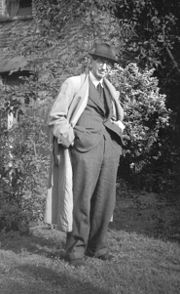
Erich Unger
Encyclopedia

Poetry
Poetry is a form of literary art in which language is used for its aesthetic and evocative qualities in addition to, or in lieu of, its apparent meaning...
, Nietzsche, political theory, general philosophy
Philosophy
Philosophy is the study of general and fundamental problems, such as those connected with existence, knowledge, values, reason, mind, and language. Philosophy is distinguished from other ways of addressing such problems by its critical, generally systematic approach and its reliance on rational...
and Jewish philosophy
Jewish philosophy
Jewish philosophy , includes all philosophy carried out by Jews, or, in relation to the religion of Judaism. Jewish philosophy, until modern Enlightenment and Emancipation, was pre-occupied with attempts to reconcile coherent new ideas into the tradition of Rabbinic Judaism; thus organizing...
.
Biography
Born in Berlin in 1887, Dr Erich Unger was interested, from an early age, in novel ideas and intellectual debate. He attended school in Berlin-LichterfeldeLichterfelde West
Lichterfelde West is part of Lichterfelde in the Steglitz-Zehlendorf borough of Berlin. It was developed from 1860 through 1900 by a wealthy businessman Carstenn from Hamburg and is a remarkable example of 19th-century Villenkolonie, a German concept of settlements completely made up of mansion...
, a wealthy residential area that was heavily influenced by Prussian nobility and members of the Prussian armed forces. At school at "Friedrich-Gymnasium" he met Oskar Goldberg who ran a literary club at the age of seventeen. As a young man Unger became one of the founder members of the literary Expressionist movement in Germany. (cf. Richard Sheppard, Die Schriften des Neuen Klubs, 1908-14, Hildesheim,1980,83). Unger's contributions to journals of the day were frequently sought after. (cf. Manfred Voigts, Vom Expressionismus zum Mythos des Hebraertums, Wurzburg: Koenigshausen und Neumann, 1994).
The first World War saw Unger in Switzerland, where he made new friends, among them Walter Benjamin
Walter Benjamin
Walter Bendix Schönflies Benjamin was a German-Jewish intellectual, who functioned variously as a literary critic, philosopher, sociologist, translator, radio broadcaster and essayist...
who admired his work and also sought his literary collaboration (cf. G.Scholem, Walter Benjamin. Briefe. Frankfurt-am-Main, 1966). In the 1920's, Unger provided an intellectual forum for a group of young and distinguished scholars who regularly discussed their ideas on science, politics and philosophy. The group rapidly became a centre for the Berlin intelligentsia of the day. (cf. Manfred Voigts, Oskar Goldberg, Berlin 1992).
The advent of Hitler ended a promising academic career and Unger took his young family into exile in 1933, first to Paris and later (1936) to London, where he lived to the end of his life in 1950.
Major Ideas
The imagination of reason or systematic imagination in philosophy. This, in Unger’s thinking, is a basic tool in any philosophical enquiry into the world of being – into reality beyond experience. Speaking of the latter, Unger writes: “The matter of the world as a whole is not an empirical object, although it is unquestionable real” (‘The Living and the Divine’ Ch.1). In this essay Unger explains how, in order to apprehend that reality and other, like concepts, such as being or consciousness, we require the imagination of reason. Not unlike astronomers who research heavenly constellations of which they have only a partial direct experience and who then need to complement their experience by using a reasoning imagination to access the aspect that is beyond their direct experience.Myth. The imagination of reason is also in evidence in Unger’s views on the function of myth in religion. His book, ‘Wirklichkeit, Mythos, Erkenntnis’ (‘Reality, Myth and Cognition’) is an early work, yet his preoccupation with myth is still seen in a later essay: ‘The Natural Order of Miracles’, the English version of which appeared in The Journal of Jewish Thought and Philosophy. Here Unger writes: “A genuine myth handles one unit: religion, science, politics, social every day life and extends [and is constrained by] the concepts of order and apprehension of natural experience. This is the source of its rational aspect. As distinct from this, the poetic myth is either pure art or, at least, half religion, half art”.
Unger’s views on Judaism are wide ranging. He notes with regret the gradual shrinking of Jewish culture to the ‘mere religion’ that it is today and suggests that, in order to revitalise Judaism, it must once again inspire and underpin our society. This does not mean that there is such a thing as ‘Jewish’ science or ‘Jewish’ technology. But Judaism may have views in other areas, in philosophy, sociology or politics, on topics such as Immortality or a specific Jewish ethical stand in political matters (cf. ‘A Restatement of Judaism’ in the Journal, Shofar).

